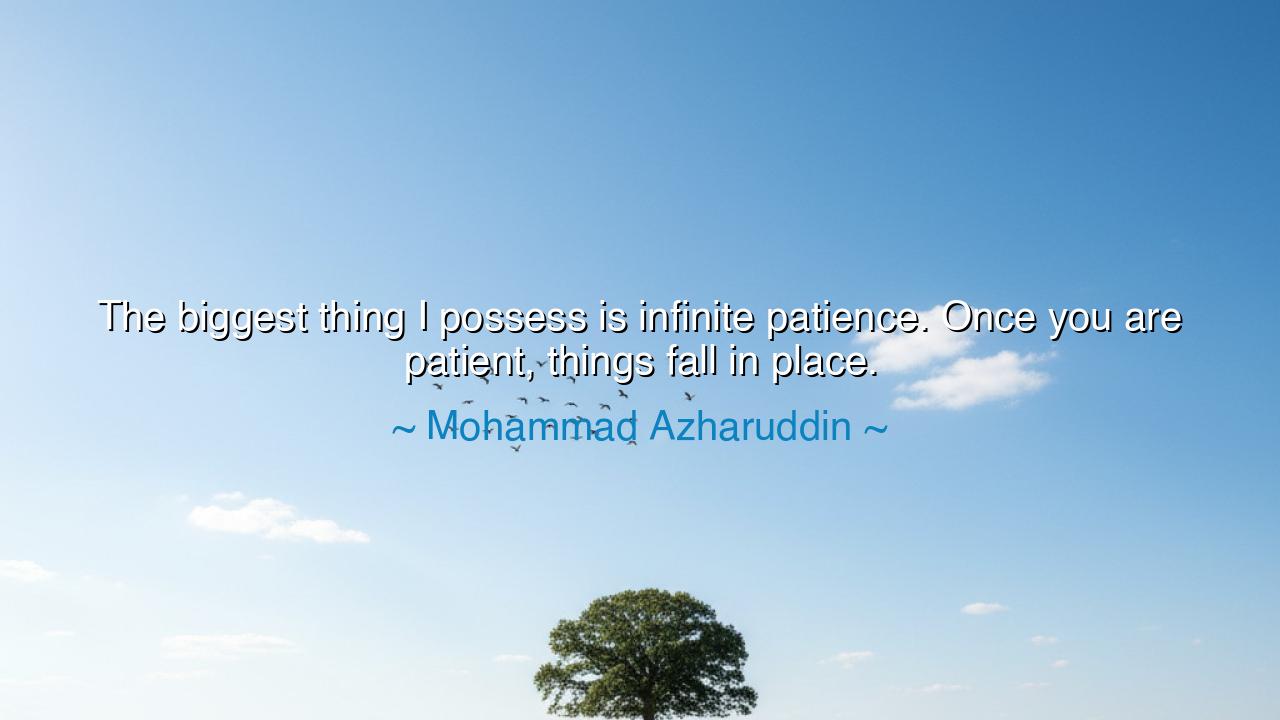
The biggest thing I possess is infinite patience. Once you are
The biggest thing I possess is infinite patience. Once you are patient, things fall in place.






Mohammad Azharuddin, the elegant cricketer of India, once declared: “The biggest thing I possess is infinite patience. Once you are patient, things fall in place.” Though simple in form, these words resound with eternal wisdom, echoing lessons that the ancients themselves would have spoken beside their temples and fires. For in every age, men have sought mastery not through swiftness of hand nor brilliance of speech, but through the quiet strength of patience, the one virtue that bends even time itself to the will of the steadfast.
Azharuddin speaks as one who has walked the long road of trial. In cricket, as in life, not every ball is meant to be struck; some must be endured, some must be watched, some must be met with restraint. A batsman without patience is like a sailor without anchor—swept away by the storm of impulses, undone by haste. But the one who waits, who trusts the moment and respects the rhythm of the game, finds that the world itself aligns in his favor. Thus he proclaims: “things fall in place”—for life, like the game, often rewards those who endure calmly rather than those who rush blindly.
The ancients, too, honored this truth. Consider the tale of King Cyrus of Persia, who, before he built his empire, spent years in obscurity and exile. Lesser men would have despaired or seized recklessly at fleeting chances, but Cyrus waited, watching, learning, preparing. When the appointed hour came, he rose with the strength of patience behind him, and the kingdoms of his enemies fell as though destiny itself had conspired in his favor. His greatness was not born in haste, but in long preparation.
Azharuddin’s own career bore the same lessons. Known for his grace at the crease, he endured seasons of triumph and seasons of despair. Critics doubted him, challenges arose, and storms threatened his name, yet his belief in patience allowed him to continue. He teaches us that patience is not mere waiting, but active endurance—the willingness to keep faith even when the path is unclear, even when the world tests one’s spirit. Through such faith, the scattered pieces of fate arrange themselves into harmony.
To those who seek to conquer life quickly, this teaching may seem weak, but it is in truth heroic. For what is harder—to strike in a moment of fury, or to endure in silence, trusting in the slow turn of fortune? The warrior who charges may win a battle, but the warrior who waits may win the war. The patient soul does not demand the world bend instantly to his will; he allows the world to unfold, and in its unfolding, discovers victory more lasting than that won by haste.
From this truth arises a lesson for all: cultivate infinite patience. When doors are slow to open, when dreams delay their arrival, do not despair. Continue your work with calm steadiness, for destiny respects those who do not falter. Be patient with others, for relationships grow not in sudden bursts, but in steady nurture. Be patient with yourself, for mastery of any art, whether cricket, music, or life itself, comes not in days but in years.
Therefore, children of the future, remember Azharuddin’s words. Possessions of gold may fade, titles may vanish, but patience endures as wealth beyond price. With it, chaos finds order, confusion finds clarity, and scattered paths converge into harmony. Walk with patience in your heart, and trust that when the time is ripe, all things will indeed fall in place.






AAdministratorAdministrator
Welcome, honored guests. Please leave a comment, we will respond soon